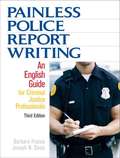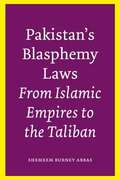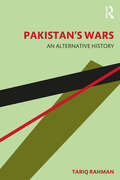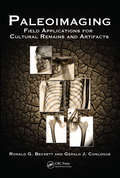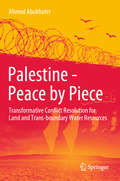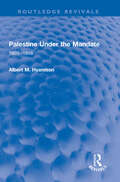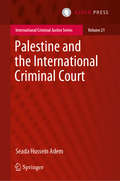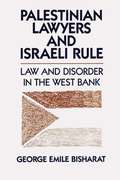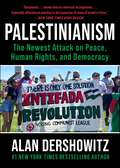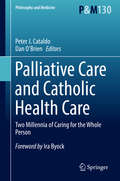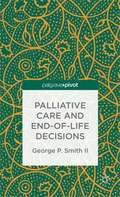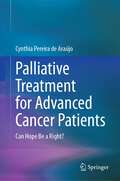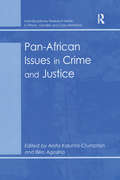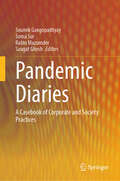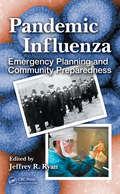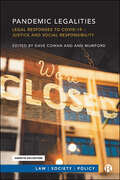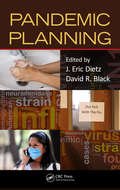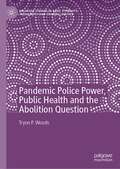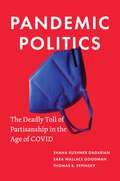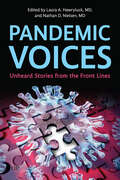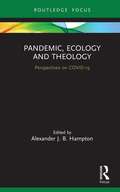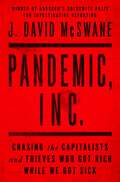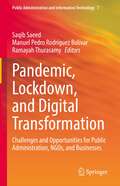- Table View
- List View
Painless Police Report Writing: An English Guide for Criminal Justice Professionals, Third Edition
by Barbara Frazee Joseph N. DavisWith an emphasis on relevance, this book tailors English instruction to the needs of police training and law enforcement. Taking a building block approach, the first five chapters present English grammar and the last two chapters are devoted to the police report writing process. Each chapter includes practice and review exercises that are taken from the field and assignment material that is geared to law enforcement interests. This edition features sample reports, sample forms and “war stories” that help students see how grammar and writing skills are used in their profession.
Pakistan's Blasphemy Laws: From Islamic Empires to the Taliban
by Shemeem Burney AbbasUnder the guise of Islamic law, the prophet Muhammad's Islam, and the Qur'an, states such as Pakistan, Afghanistan, Egypt, Saudi Arabia, and Bangladesh are using blasphemy laws to suppress freedom of speech. Yet the Prophet never tried or executed anyone for blasphemy, nor does the Qur'an authorize the practice. Asserting that blasphemy laws are neither Islamic nor Qur'anic, Shemeem Burney Abbas traces the evolution of these laws from the Islamic empires that followed the death of the Prophet Muhammad to the present-day Taliban. Her pathfinding study on the shari'a and gender demonstrates that Pakistan's blasphemy laws are the inventions of a military state that manipulates discourse in the name of Islam to exclude minorities, women, free thinkers, and even children from the rights of citizenship. Abbas herself was persecuted under Pakistan's blasphemy laws, so she writes from both personal experience and years of scholarly study. Her analysis exposes the questionable motives behind Pakistan's blasphemy laws, which were resurrected during General Zia-ul-Haq's regime of 1977-1988--motives that encompassed gaining geopolitical control of the region, including Afghanistan, in order to weaken the Soviet Union. Abbas argues that these laws created a state-sponsored "infidel" ideology that now affects global security as militant groups such as the Taliban justify violence against all "infidels" who do not subscribe to their interpretation of Islam. She builds a strong case for the suspension of Pakistan's blasphemy laws and for a return to the Prophet's peaceful vision of social justice.
Pakistan's Experience with Formal Law
by Osama SiddiqueLaw Reform in Pakistan attracts such disparate champions as the Chief Justice of Pakistan, the USAID and the Taliban. Common to their equally obsessive pursuit of 'speedy justice' is a remarkable obliviousness to the historical, institutional and sociological factors that alienate Pakistanis from their formal legal system. This pioneering book highlights vital and widely neglected linkages between the 'narratives of colonial displacement' resonant in the literature on South Asia's encounter with colonial law and the region's post-colonial official law reform discourses. Against this backdrop, it presents a typology of Pakistani approaches to law reform and critically evaluates the IFI funded single-minded pursuit of 'efficiency' during the last decade. Employing diverse methodologies it proceeds to provide empirical support for a widening chasm between popular, at times violently expressed, aspirations for justice and democratically deficient reform designed in distant IFI headquarters that is entrusted to the exclusive and unaccountable Pakistani 'reform club. '
Pakistan's Wars: An Alternative History
by Tariq RahmanThis book studies the wars Pakistan has fought over the years with India as well as other non-state actors. Focusing on the first Kashmir war (1947–48), the wars of 1965 and 1971, and the 1999 Kargil war, it analyses the elite decision-making, which leads to these conflicts and tries to understand how Pakistan got involved in the first place. The author applies the ‘gambling model’ to provide insights into the dysfunctional world view, risk-taking behaviour, and other behavioural patterns of the decision makers, which precipitate these wars and highlight their effects on India–Pakistan relations for the future. The book also brings to the fore the experience of widows, children, common soldiers, displaced civilians, and villagers living near borders, in the form of interviews, to understand the subaltern perspective. A nuanced and accessible military history of Pakistan, this book will be indispensable to scholars and researchers of military history, defence and strategic studies, international relations, political studies, war and conflict studies, and South Asian studies.
Paleoimaging: Field Applications for Cultural Remains and Artifacts
by Ronald G. Beckett Gerald J. ConlogueMedical and industrial imaging methods have come to be recognized as powerful tools for documentation and data collection in many nontraditional settings. In Paleoimaging: Field Applications for Cultural Remains and Artifacts, two of the most preeminent experts in the field provide an in-depth examination of a range of imaging techniques and explain how these techniques can be applied to all aspects of forensic and archaeological analysis.The first part of the book examines paleoimaging multimodalities, highlighting the advantages and disadvantages of each imaging technique in different scenarios. The authors explore photography, conventional radiography, endoscopy, and various forms of computer-based imaging. Next, they present methodological and procedural standards for the various imaging techniques. They also demonstrate how multimodal imaging can assist nondestructive data collection of non-biological cultural artefacts. A final section addresses radiation safety and field safety concerns. Case studies, tables, and templates of forms for documentation of findings enhance the text with practical information.Filled with over 380 images, this book is supplemented with an accompanying downloadable resource in which the authors draw from their global experience in the paleoimaging of cultural remains and artefacts, offering a view of the diverse environments in which field paleoimaging is conducted. The breadth of the authors’ expertise and the rich images contained in the book and downloadable resources make this resource an essential reference for those who seek to explore the mysteries of the past.
Palestine - Peace by Piece: Transformative Conflict Resolution for Land and Trans-boundary Water Resources
by Ahmed AbukhaterThis book draws lessons and conclusions, based on the methodology outlined in the author's previous book, Water as a Catalyst for Peace (Routledge, 2013), and further charts the course to a more practical framework for achieving regional stability and justice. Past agreements are examined and analysed, outlining the change along the way that occurred to the land and people of Palestine. The book is written with the intention of exposing past events that led to the current situation, evaluating the current state of the conflict in light of new circumstances and the reality on the ground. Viable options are explored to seek a practical and satisfactory negotiated settlement that ensures justice and viability. In conclusion, a roadmap for future direction is proposed to achieve equitable water allocation through proper negotiation between Israel and Palestine and to ultimately settle the conflict. Water resources allocation is at the heart of this pragmatic framework and roadmap.
Palestine Under the Mandate: 1920-1948 (Routledge Revivals)
by Albert M. HyamsonFirst published in 1950, Palestine Under the Mandate is an account of the role of Britain in Palestine during the British mandate period from 1920 to 1948. The author served as the chief immigration officer in British Mandate of Palestine from 1921 to 1934 and considers this book an attempt to dissipate the fog of propaganda in which the whole subject is shrouded. He delineates the difference between the terms Jew, Jewish and Zionist before situating the central question of his argument: What would have been the position of the Jewish National Home today if its germ had not been carefully nursed and protected for a quarter of the century after the acceptance of the Mandate? Since the author was a government employee, it is no surprise that his loyalty lies with the British government; however, this book is still an important record of the arguments employed to both build and destroy Palestine and will be worth reading for students of history, politics, international relations, global studies, and geography.
Palestine and the International Criminal Court (International Criminal Justice Series #21)
by Seada Hussein AdemThis book deals with the possible investigation and prosecution by the International Criminal Court (ICC) of crimes allegedly committed in the Israeli-Palestinian conflict. In light of the Rome Statute and the Practice of the Office of the Prosecutor of the Court, among others, it examines the route, possible outcomes, and challenges that may arise were the Palestine situation to be brought before the ICC.The subject matter is approached using the route the Prosecutor of the Court would generally employ to deal with situations. The publication offers a step-by-step procedure by which to conduct the preliminary examination and investigation of the situation in Palestine and deals with matters of jurisdiction, followed by a discussion of the fundamental concepts of complementarity and gravity to determine the admissibility before the ICC. Alleged crimes particularly unique to the Israeli-Palestinian conflict, such as the construction of settlements, forced displacement, house demolitions, the expropriation of land, the crime of apartheid and the blockade of Gaza, are dealt with in light of the Rome Statute and international law.On the basis of the established theories of transitional justice, the possible impacts of an ICC investigation and prosecution on the conflict are analysed and a number of insights are shared with regard to the impacts of the ICC on combatting impunity, fostering Palestine’s statehood, peace negotiations and the stability of the region. Due to the politicisation of the conflict and the various interests at stake, the impact of the ICC’s involvement on the credibility of the ICC itself is also reviewed. Recognizing the numerous impacts of the conflict on the existence of the two nations and the multitude of causes for its perpetuity, it does not limit itself to the ICC, but also provides other conflict resolution alternatives that could enable reconciliation and sustainable peace in the region.This book provides an array of opinions and a crucial input for researchers and practitioners alike, while it is also useful to those investigating and possibly involved in prosecutions regarding Palestine or other similar situations before the ICC.Seada Hussein Adem obtained a PhD from Humboldt University of Berlin, Germany, an LLM from the University of the Western Cape, South Africa, and an LLB from Haramaya University, Ethiopia.
Palestinian Lawyers and Israeli Rule: Law and Disorder in the West Bank
by George Emile BisharatAs frequent intermediaries between Israeli military authorities and Palestinian citizens, Palestinian lawyers stand close to the fault line dividing Israeli and Palestinian societies. The conflicts and tensions they experience in their profession mirror the larger conflicts between the two societies. Thus, as George Bisharat reveals in Palestinian Lawyers and Israeli Rule, a careful study of the work and lives of Palestinian lawyers ultimately helps to illuminate the causes of the intifada, or uprising, that began in December 1987. The study revolves around the central question of why the Palestinian legal profession declined during twenty years of Israeli occupation when, in other Third World countries, the legal profession has often reached its peak during a period of Western colonization. Bisharat answers this question with a wide-ranging inquiry into the historical origins of the legal profession and court system in Palestine, the tenuous grounding of these institutions in Palestinian society and culture, and the structure, style, and policies of the late-twentieth-century Israeli military government in the West Bank. For general readers interested in the Palestinian-Israeli conflict, as well as specialists in such fields as legal anthropology, sociology of the professions, Third World law and development, and Middle Eastern studies, Palestinian Lawyers and Israeli Rule will be required reading. As frequent intermediaries between Israeli military authorities and Palestinian citizens, Palestinian lawyers stand close to the fault line dividing Israeli and Palestinian societies. The conflicts and tensions they experience in their profession mirror the larger conflicts between the two societies. Thus, as George Bisharat reveals in Palestinian Lawyers and Israeli Rule, a careful study of the work and lives of Palestinian lawyers ultimately helps to illuminate the causes of the intifada, or uprising, that began in December 1987. The study revolves around the central question of why the Palestinian legal profession declined during twenty years of Israeli occupation when, in other Third World countries, the legal profession has often reached its peak during a period of Western colonization. Bisharat answers this question with a wide-ranging inquiry into the historical origins of the legal profession and court system in Palestine, the tenuous grounding of these institutions in Palestinian society and culture, and the structure, style, and policies of the late-twentieth-century Israeli military government in the West Bank. For general readers interested in the Palestinian-Israeli conflict, as well as specialists in such fields as legal anthropology, sociology of the professions, Third World law and development, and Middle Eastern studies, Palestinian Lawyers and Israeli Rule will be required reading.
Palestinianism: The Newest Attack on Peace, Human Rights, and Democracy
by Alan DershowitzPalestinianism is not only the newest manifestation of anti-Semitism; it also poses grave threats to peace, human rights, and democratic values. Its dangers must be exposed and challenged in the marketplace of ideas. It is the purpose of this book to pose that challenge and to put Palestinianism on trial for the moral crimes of bigotry, incitement to violence, and destroying any prospects for peace. By &“Palestinianism,&” Alan Dershowitz does not mean merely supporting a Palestinian state or the rights and well-being of the Palestinian people. Those are entirely reasonable positions to take. He means only the obsessive focus on the claims of Palestinians and their supporters—to the exclusion or minimization of the claims of other, more deserving, groups. This singular focus on the &“rights&” of Palestinians is coupled with an equivalent singular focus on the alleged &“wrongs&” of only one country—Israel, the nation-state of the Jewish people. It is the coupling of these biases that constitutes the new &“Palestinianism&” that we are now experiencing on university campuses, in international organizations, among hard-left politicians, and in many media. In Palestinianism, Dershowitz explores the sources of contemporary Jew-hatred, Israel demonization, and other threats to Jewish communities around the world. He demonstrates why he believes things are likely to get worse, as they did in Germany during the late 1930s. He does not believe they will culminate in another genocidal holocaust but that when the young bigots who so fervently rally behind Palestinianism grow into influential adults, they will increase the hatred against Jews and their nation-state. He argues that Jews and their state must become more self-reliant, and less dependent on the approval, support, or selection by others.
Palliative Care and Catholic Health Care: Two Millennia of Caring for the Whole Person (Philosophy and Medicine #130)
by Peter J. Cataldo Dan O’BrienThis book offers a comprehensive overview of the compatibility of palliative care with the vision of human dignity in the Catholic moral and theological traditions. The unique value of this book is that it presents expert analysis of the major domains of palliative care and how they are compatible with, and enhanced by, the holistic vision of the human person in Catholic health care. This volume will serve as a critically important ethical and theological resource on palliative care, including care at the end of life, for bioethicists, theologians, palliative care specialists, other health care professionals, Catholic health care sponsors, health care administrators and executives, clergy, and students. Patients receiving palliative care and their families will also find this book to be a clarifying and reassuring resource.
Palliative Care and End-of-Life Decisions
by Ii George P. SmithTotal pain management mandates that an ethic of adjusted care be implemented at the end-stage of life which acknowledges ethically, legally, and clinically the use of terminal sedation as efficacious treatment.
Palliative Treatment for Advanced Cancer Patients: Can Hope Be a Right?
by Cynthia Pereira AraújoThis book presents an important reflection on the concept and limits of the Fundamental Right to Health as opposed to a supposed “Right to Hope” in the context of the treatment of patients with advanced cancer. The central idea of the work is the question of whether and to what extent patients with advanced cancer have the right to legally demand a palliative treatment whose efficacy has not been proven from the point of view of the desired objectives. The book demonstrates how hope cannot be subject to legal protection and, also, that, even if theoretical-legal reasons were not sufficient for the absence of an abstract right to hope, ethical reasons would be. The work concludes that the best palliative care, rather than palliative treatment, guarantees the best right to health for advanced cancer patients, especially in terminal cases.In addition to this theoretical discussion, the book also presents the results of a qualitative research the author conducted with 48 advanced cancer patients in Brazil and Germany to investigate their expectations towards chemotherapy. This study has confirmed that many patients decide to undergo often toxic and exhausting treatments, unrealistically believing that their cancer is curable or that, as long as they continue with a course of chemotherapy, cancer may be beaten. Palliative Treatment for Advanced Cancer Patients: Can Hope Be a Right? will be of interest to health professionals and social workers working with advanced cancer patients, as well as to researchers in the fields of public health, bioethics, medical ethics and health law, especially those interested in the growing interdisciplinary field of end-of-life decision-making.
Pan-African Issues in Crime and Justice (Interdisciplinary Research Series in Ethnic, Gender and Class Relations)
by Biko AgozinoCriminology assumes the position of an established discipline, yet its influence is limited by its primary focus on the West for both theoretical and empirical substance. But the growing interest in comparative criminology now means that countries compare notes, thereby broadening the parameters of criminology. Still relatively ignored in the literature, however, are issues of crime and justice as they affect people of African descent around the globe. Drawing upon materials from countries in Africa, the Caribbean, North and South America, and Europe, this stimulating book reflects on the experiences of people of African descent to offer a convergence of criminologies in and outside the West. Simultaneously, it acknowledges Western criminology as a significant angle from which to comprehend crime and justice as they are conceptualized outside the West. The volume also investigates whether Western criminological accounts are relevant to the comprehension of crime, criminality and systems of justice in Africa, the Caribbean and South America.
Pandemic Diaries: A Casebook of Corporate and Society Practices
by Rabin Mazumder Soumik Gangopadhyay Soma Sur Saugat GhoshThis book provides valuable insights into the challenges faced by businesses striving for survival during the COVID-19 pandemic. It presents the grave issues encountered during the pandemic, highlighting the threats and the strategies adopted to seize opportunities in adversity. Through a case-based approach, the book explores recent trends, issues, and best practices in Corporate Governance, Corporate Social Responsibility, Information Technology, Psychological Stability, Marketing, Human Resource Management, and Sustainability. The primary objective of this book is to help readers comprehend the strategic management practices essential for business survival during times of crisis. It examines the innovative approaches and practices adopted by businesses during the pandemic and evaluates their effectiveness in ensuring sustainability. The authors analyze sustainable issues from both subjective and objective dimensions, offering a comprehensive understanding of sustainable practices in the corporate world. Each chapter of the book presents strategic applications of innovative practices and trends in various management fields. The narratives present strategic case studies in marketing management, human resource management, financial management, and supply chain management, providing valuable insights for aspiring managers, practitioners, and researchers alike.
Pandemic Governance: Learning from COVID and Future Pathways
by Walter Amedzro St-HilaireThis book attempts to analyze the issues raised by the chronicity of the Covid pandemic and its governance. The author analyzes the information resources mobilized to combat the pandemic in industrialized countries and pays particular attention to the operational mechanisms. The analysis seeks to clarify the modalities of operation of the crisis system management, while at the same time looking at the decision-making mechanisms. The main lines of analysis retained are: the piloting and management of the crisis, the markets for ordering protective equipment and vaccine, the hospital organization and the prevention campaign, and the costs and the methods of financing. Finally, the author asks whether it might not therefore be appropriate to rethink the organization of the pandemic’s governance and if health crisis governance should be opened up more to deal with societal challenges. This organization is too complex and suffers both from a certain heaviness and from a lack of resources, which are detrimental to its proper functioning. It should first and foremost be open to people in the field whose absence weighs heavily on the organization of the response to the pandemic. It should also be open to other specialties, even if they seem far removed from public health and medicine, if they are useful to the government in guiding its actions. Prof. Post-Dr. Walter Amedzro St-Hilaire is the author of more than 20 books and around 40 scientific articles. His specialization areas include portfolio management, project management, entrepreneurship policies, corporate and technology governance, business technology, strategic management, business economics, risk management, economic infrastructures, public administration, international development, and applied economics. He has taught at various universities in Canada and the USA. He has served as Chief Resources Economist and Principal Officer of Procurement Operations for UEB United European Bank and as a Technical Advisor on Economic Strategies and Policy Development for the World Bank. He is also a project economics and financial business expert for several institutions and international organizations.
Pandemic Influenza: Emergency Planning and Community Preparedness
by Jeffrey R. RyanThe swine flu emergency needn‘t become a crisis. This critically acclaimed work provides public health officials, doctors, responders, and emergency planners with accurate current information that will help them understand the nature of an outbreak, assess risk, answer public concerns, and develop informed strategies. Devoid of sensationalism and a
Pandemic Legalities: Legal Responses to COVID-19 – Justice and Social Responsibility (Law, Society, Policy)
by Dave Cowan and Ann MumfordThe effects of COVID-19 are visited disproportionately on the already disadvantaged. This important text maps out ways in which those already disadvantaged have been affected by legal responses to COVID-19. Contributors tackle issues including virtual trials, adult social care, racism, tax and spending, education and more. They reflect on the implications of COVID-19 and express concerns with policy and practice developments and with the neutral version of the law and the economy which has taken root. Drawing on diverse resources, this text offers an account of the damage caused by legal responses to the pandemic and demonstrates how the future response can be positive and productive.
Pandemic Planning
by David R. Black J. Eric DietzPreparedness and rigorous planning on community, state, and regional levels are critical to containing the threat of pandemic illness. Steeped in research and recommendations from lessons learned, Pandemic Planning describes the processes necessary for the efficient and effective preparation, prevention, response, and recovery from a pandemic threa
Pandemic Police Power, Public Health and the Abolition Question (Palgrave Studies in Race, Ethnicity, Indigeneity and Criminal Justice)
by Tryon P. WoodsThis book critically explores how police power manifested beyond criminal law into the field of public health during the pandemic. Whilst people were engaged with anti-police violence protests, particularly in the US, they were being policed openly and notoriously by the government and medical science in the public health arena. The book explores how public health policing might be an abuse of constitutional power and encourages the abolition question to be applied consistently to the state’s discourse in the area of public health, as black people the world over continue to bear a disproportionate cost burden for public health policies. The chapters explore contemporary policing in terms of the historical context of slavery, the growth of the police and prison abolition movement and how this should be applied more widely, and how police power operates throughout society beyond the criminal justice system, in finance, technology, housing, education, and in medicine and health science. It seeks to re-examine our relationship to health sovereignty and the police power more fundamentally. It provides insights into the convergence of policing and social control of humans and argues that the most normative response is abolition.
Pandemic Politics: The Deadly Toll of Partisanship in the Age of COVID
by Thomas B. Pepinsky Sara Wallace Goodman Shana Kushner GadarianHow the politicization of the pandemic endangers our lives—and our democracyCOVID-19 has killed more people than any war or public health crisis in American history, but the scale and grim human toll of the pandemic were not inevitable. Pandemic Politics examines how Donald Trump politicized COVID-19, shedding new light on how his administration tied the pandemic to the president’s political fate in an election year and chose partisanship over public health, with disastrous consequences for all of us.Health is not an inherently polarizing issue, but the Trump administration’s partisan response to COVID-19 led ordinary citizens to prioritize what was good for their “team” rather than what was good for their country. Democrats, in turn, viewed the crisis as evidence of Trump’s indifference to public well-being. At a time when solidarity and bipartisan unity were sorely needed, Americans came to see the pandemic in partisan terms, adopting behaviors and attitudes that continue to divide us today. This book draws on a wealth of new data on public opinion to show how pandemic politics has touched all aspects of our lives—from the economy to race and immigration—and puts America’s COVID-19 response in global perspective.An in-depth account of a uniquely American tragedy, Pandemic Politics reveals how the politicization of the COVID-19 pandemic has profound and troubling implications for public health and the future of democracy itself.
Pandemic Voices: Unheard Stories from the Front Lines
by Laura A. Hawryluck Nathan D. NielsenPandemic Voices sheds light on previously unheard or overlooked international perspectives of patients and health care and community services workers through unprecedented access to some of the most challenging moments of the COVID-19 pandemic: the innovations, the stories of lives saved, those of lives lost, and the prices paid. Divided into seven thematic sections, the collection chronicles the experiences from the front lines of the pandemic. It highlights the disruptions faced by medical systems and the innovative adaptations that emerged to simply keep them functioning, as well as the pandemic impacts from locations overlooked by global media. The book delves into the profound effects on health care workers and reveals insights into strain on health care systems. It amplifies the voices of individuals who faced unique struggles during the pandemic, such as caregivers for children with special needs or individuals battling addiction, in times when resources were basically non-existent in a chaotic landscape. The collection concludes with a reflection on how history will judge our pandemic-era actions, alongside the hard lessons learned on truth, science, and advocacy throughout these challenging years. In sharing the heartbreaks, the triumphs, and the scars that left none of us untouched, Pandemic Voices assesses what we have been through – what went well, what did not – in order to learn and, in time, hopefully to heal.
Pandemic, Ecology and Theology: Perspectives on COVID-19 (Routledge Focus on Religion)
by Alexander J. B. HamptonAs the sequential stages of the 2020 COVID-19 pandemic have unfolded, so have its complexities. What initially presented as a health emergency, has revealed itself to be a phenomenon of many facets. It has demonstrated human creativity, the oft neglected presence of nature, and the resilience of communities. Equally, it has exposed deep social inequities, conceptual inadequacies, and structural deficiencies about the way we organize our civilization and our knowledge. As the situation continues to advance, the question is whether the crisis will be grasped as an opportunity to address the deep structural, ecological and social challenges that we brought with us into the second decade of the new millennium. This volume addresses the collective sense that the pandemic is more than a problem to manage our way out of. Rather, it is a moment to consider our broken relationship with the natural world, and our alienation from a deeper sense of purpose and meaning. The contributors, though differing in their diagnoses and recommendations, share the belief that this moment, with its transformative possibility, not be forfeit. Equally, they share the conviction that the chief ground of any such reorientation ineluctably involves our collective engagement with both ecology and theology.
Pandemic, Inc.: Chasing the Capitalists and Thieves Who Got Rich While We Got Sick
by J. David McSwane&“This startling, vital book deserves our attention.&” —San Francisco Chronicle For readers of War Dogs and Bad Blood, an explosive look inside the rush to profit from the COVID-19 pandemic, from the award-winning ProPublica reporter who saw it firsthand. The United States federal government has spent over $10 billion on medical protective wear and emergency supplies, yet as COVID-19 swept the nation, life-saving equipment such as masks, gloves, and ventilators was nearly impossible to find. In this brilliant nonfiction thriller, award-winning investigative reporter J. David McSwane takes us behind the scenes to reveal how traders, contractors, and healthcare companies used one of the darkest moments in American history to fill their pockets. Determined to uncover how this was possible, he spent over a year on private jets and in secret warehouses, traveling from California to Chicago to Washington DC, to interview both the most treacherous of profiteers and the victims of their crimes. Pandemic, Inc. is the story of the fraudster who signed a multi-million-dollar contract with the government to provide lifesaving PPE, and yet never came up with a single mask. The Navy admiral at the helm of the national hunt for additional medical resources. The Department of Health whistleblower who championed masks early on and was silenced by the government and conservative media. And the politician who callously slashed federal emergency funding and gutted the federal PPE stockpile. Winner of the Goldsmith Prize for Investigative Reporting, McSwane connects the dots between backdoor deals and the spoils systems to provide the definitive account of how this pandemic was so catastrophically mishandled. Shocking and revelatory, Pandemic, Inc. exposes a system that is both deeply rigged, and singularly American.
Pandemic, Lockdown, and Digital Transformation: Challenges and Opportunities for Public Administration, NGOs, and Businesses (Public Administration and Information Technology #7)
by Saqib Saeed Manuel Pedro Rodríguez Bolívar Ramayah ThurasamyThis edited volume discusses digital transformation in the context of the COVID-19 pandemic. In the wake of the COVID-19 pandemic and the widespread lockdown policies that followed, digital technologies were touted as an effective means towards ensuring continuity and minimal interruption of day-to-day operations for businesses and other institutions. Digital transformation, however, is an inherently complex process and the pressure of short adoption times may further increase complexities for organizations looking to foster digital technologies. This volume comprises original research contributions on theoretical foundations and empirical studies of digital transformations in the pandemic era. Written by academics and practitioners from diverse disciplines and industries, the chapters cover topics such as psychological and technical implications of pandemic situations, the economic, organizational, social, and legal implications of digital adoption, and case studies for digital transformation in different industries. This book will be useful for academics, technology professionals, business policy makers, NGO managers, and governments looking to optimize their digital transformation processes to better prepare their organizations in the presence of pandemic situations.
